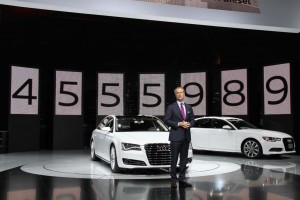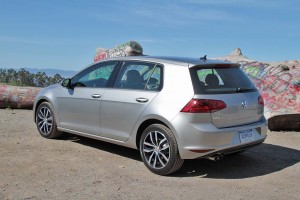Volkswagen’s plan to recall and repair thousands of vehicles using its rigged 3.0-liter diesel has gotten the thumbs-down from California regulators.
VW late last month agreed to spend $14.7 billion to settle consumer lawsuits and U.S. government allegations that it cheated on emissions tests involving its 2.0-liter turbodiesel. The deal includes plans to buy back about 475,000 of those vehicles sold in the U.S. since 2009. But the German maker said it was working up a fix for the larger 3.0-liter diesel that would eliminate the need for a similar buyback program.
That proposal has been rejected, according to a letter the California Air Resources Board has sent to VW. It declared that the proposed fix is ” incomplete, substantially deficient, and fall(s) far short of meeting the legal requirements to return these vehicles to the claimed certified configuration.”
(U.S. officials announce the diesel deal with VW. Click Here for more.)
Before it can move ahead and resolve the problem with the 3.0-liter diesel, VW will have to win approval of both CARB and the U.S. Environmental Protection Agency. CARB said it will continue to work with the automaker to find a fix that “fully mitigates the excess emissions.”
About 85,000 vehicles using the bigger diesel were sold in the U.S. under the Volkswagen, Audi and Porsche brands during 2009 to 2016 model-years. These include the VW Touareg and Porsche Cayenne SUVs as well as Audi’s A6, A7 and A8 sedans.
VW had also hoped to come up with a fix for the 2.0-liter diesel and has, in fact, begun repairing nearly 11 million more vehicles sold outside the U.S. But American emissions standards for diesels are among the toughest in the world and the settlement reached last month assumes that the automaker may eventually have to buy back and scrap as much as 85% of those 475,000 vehicles.
VW still believes it can come up with an acceptable repair that it could implement on at least some of the later models using the 2.0-liter engine.
And it says it is still working to deliver an acceptable fix for the bigger engine “as quickly as possible.” It downplayed CARB’s rejection as a “procedural step.”
The settlement announced last month was the largest in the history of the Clean Air Act. It includes not only $10 billion for the vehicle buyback program but $2.0 billion to promote the sale of zero-emissions vehicles and another $2.7 billion for an environmental remediation effort.
The latter program aims to offset the added pollution created by the rigged VW diesels by funding efforts to get older diesel trucks, buses and stationary power sources replaced with newer, cleaner technology. California will get the largest share of that fund, about $375 million.
(Germany says it won’t fine VW for cheating on diesel emissions. Click Here for the story.)
California also has the largest number of the rigged 3.0-liter Volkswagen diesels operating within the state, about 16,000 in all.
Even if VW can eventually come up with an acceptable fix for the emissions problem, it is expected to have to spend billions more to settle owner lawsuits and pay government fines.
During a joint government agency news conference last month, officials from the Justice Department noted that VW may also yet face criminal sanctions that could include both civil fines and criminal charges. The maker also remains under investigation in Germany where former VW CEO Martin Winterkorn has been named as one potential target.
(Mazda still may enter US diesel market, says North American CEO. Click Here for the latest.)


